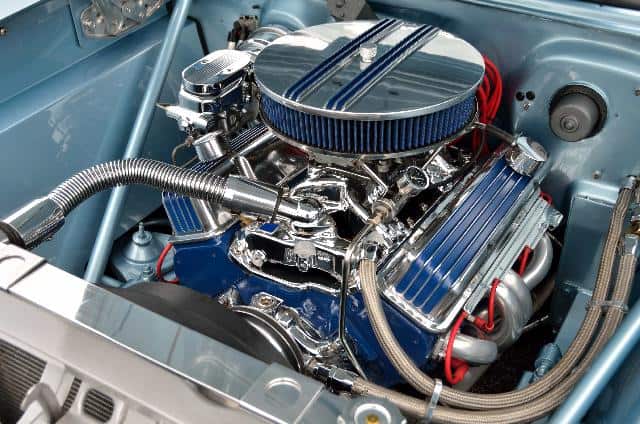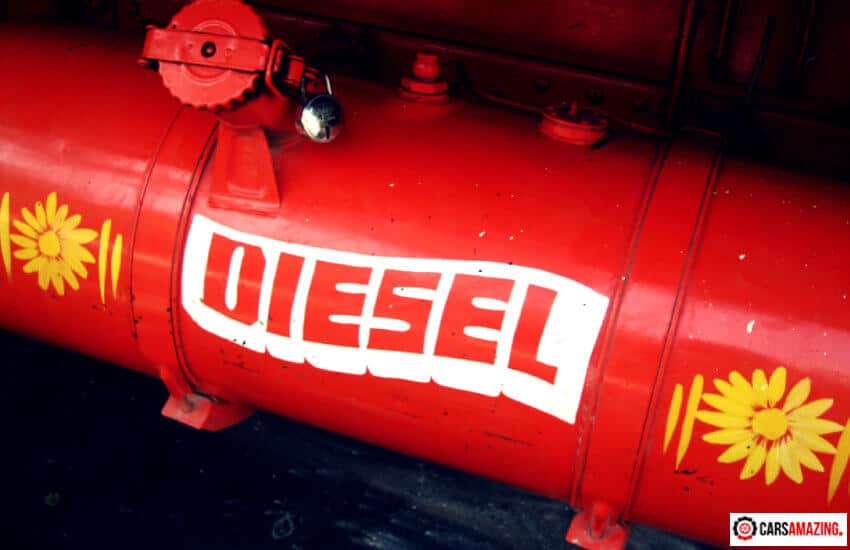Last Updated on December 27, 2022 by Leepu Da Maxim
Large vehicles are powered by diesel rather than petrol because diesel has a stronger torque. Fuels such as gasoline and diesel have different compression resistances. Compression-fired diesel engines can be made by using diesel fuel, which has more compressive resistance than gasoline.
Key Takeaways
- Diesel fuel has a higher energy density making diesel engines to be more efficient and producing more power
- Diesel engines are more durable and have longer service lives compared to other types of vehicles
- Diesel fuel is cheaper compared to other types of fuels so it becomes a more economical choice for trucking companies
- Diesel engines emit less carbon monoxide and hydrocarbons, which makes them more environmentally friendly
10 Reasons Why Trucks Use Diesel Fuel
Diesel Fuels are the most common type of engine fuel in trucks. Diesel fuel is made of a hydrocarbon mixture that includes diesel oil. This type of fuel is able to use a higher compression ratio without knocking or pinging, which means it can generate more power and torque. Another advantage diesel has over gasoline is that it has a higher cetane number, meaning that the fuel ignites more easily.

More Reasons to use Diesel are as follows –Serial Reasons Diesel Use Cases 1. Durability A diesel engine can provide a much longer life. 2. Maintenance A gasoline engine requires a smaller maintenance budget. 3. Fuel usage The diesel engine is more fuel-efficient. 4. Energy Diesel fuel provides more energy than gasoline. 5. Trailer A diesel engine is the best choice for working with heavy loads. A gasoline engine is more convenient for working without loads. 6. Power The diesel engine offers more torque with a heavy load and low rpm. 7. Pricing The cost of diesel fuel can range from $0.87 per gallon to $2.00 per gallon whereas gasoline can range from $2.00 to $3.00 per gallon depending on the location of the purchaser, taxes, and other factors such as climate changes or natural disasters. 8. Less-Risky Diesel fuel is less likely to ignite when it comes in contact with high temperatures. Trucks use diesel because it has better lubricating properties and can tolerate higher temperatures before it starts to break down. 9. Cetane Rating Diesel fuel has a higher cetane rating, which improves engine performance under all operating conditions. Higher-cetane diesel blends can reduce particulate emissions from combustion engines by up to 90% compared with those using petroleum-based gasoline. Diesel engines are typically more resistant to knocking (or pinking) when running on high-cetane fuels such as ultra-low sulfur diesel (ULSD). 10. Performance Diesel fuel also holds its energy longer than gasoline, which means that it’s cheaper to operate on a per-mile basis.
Some Interesting States of Diesel Fuel Usages in the USA
The United States is a major consumer of diesel, which is mainly used for transportation purposes. In 2016, the United States consumed more than 114 billion gallons (377 billion liters) of diesel fuel. The transportation sector accounted for over 99% of this consumption.
The U.S. Energy Information Administration projects that U.S. consumption of diesel will continue to grow through 2040 in part because there are no viable alternatives at this time to the use of diesel for long-haul trucking and commercial aviation, as well as other uses such as electricity generators and in the production of petrochemicals.
- The world’s first “diesel-powered” automobile trip was completed on Jan. 6, 1930.
- A large majority of diesel fuel we use in the U.S. is made from crude oil.
- People have been using vegetable oil for a while, but now the use of biodiesel is also prevalent.
- Diesel fuel may be used to power most equipment on farms and construction sites in North America
- Diesel engines are essential for heavy construction jobs, such as lifting steel beams, digging foundations and trenches, drilling wells, paving roads, and moving soil.
What’s The Best Choice For Pickup Trucks?
Here, it is necessary to mention that it is not a simple and general answer between diesel and gasoline engines. On the one hand, engine life is much longer in diesel engines. So, you can get a few hundred thousand extra miles for your vehicle. On the other hand, today’s diesel engines are much more efficient compared to pre-2005 models.
Also, the blocks that make up the entire diesel engine and its internal parts are much stronger and more robust than other options. This is why these engines have the superior ability to work with much higher compression ratios, compared to other engine types. This is why the efficiency during operation in the harshest conditions is higher compared to gas engines.
In particular, it is important to consider that when a truck has considerable additional weight and functionality is the same in both engines. However, a truck does not usually have a certain additional weight only every few years. On the contrary, it is quite common for pickup trucks to be used to transport objects of different weights.
On the other hand, there are different types of diesel engines with different costs. One of the most recommended options for experts is pickup trucks that have a manual transmission, as it is much easier to operate. In the same sense, it is also a much cheaper option compared to automatic transmissions.
Which Engine Is Better In Terms Of Maintenance?
As you can see, both diesel and gas engines do not require the same maintenance over their entire service life. So, we could mention that in this case, the advantage is on the side of gas engines. In simple words, a diesel engine requires a larger budget when performing proper maintenance.
So, for those users who want to reduce costs, this aspect is probably important. To begin with, we must take into account that diesel engines can retain a greater amount of oil. Therefore, logically, these engines require a greater amount of oil to function. This simple fact manages to increase a little the necessary budget of any user.
Additionally, a diesel engine has a large number of components and filters that are located between the exhaust system and the fuel system. To have optimal functionality, it is necessary to replace each of these components from time to time. On the other hand, this large number of filters and components are not present in gasoline engines.
Concerning the diesel engine, a supplement is also required to meet the requirements for emissions. Therefore, to reduce this inconvenience, a diesel exhaust fluid is needed. In other words, it is an additional component that only increases maintenance costs.
On the other hand, it is also necessary to take into account that the wear and tear of diesel engines are usually lower in many situations. In particular, a diesel engine can work efficiently at a low number of revolutions per minute. This reduces the wear and tear of various engine components.
Also, a diesel engine can compensate for maintenance costs at times when it has to work for long periods at considerable force. At this time, gasoline engines may have some faults that will not be found in diesel engines.
Features To Be Considered:
1.Diesel engines have more filters and components that must be replaced
2. Gasoline engines have more internal faults under tough operating conditions
3. Diesel engines suffer less wear when working at low revolutions per minute
4. Gasoline engines do not require exhaust fluid as they do with diesel engines
How Much Fuel Does A Diesel Engine Waste?
To continue the comparison, it is important to mention that diesel engines are more fuel-efficient. These days, most drivers of a diesel engine vehicle require 20 million per gallon to operate. This is even 5 miles per gallon less than vehicles in previous years.
However, there are several light-duty, mid-size pickups that have been rated for up to 30 miles per gallon. In turn, as the truck gets bigger and works with more weight, then the fuel efficiency increases. As mentioned above, a diesel engine works best at a low rpm and a high weight load.
Hence, a diesel engine offers higher fuel efficiency compared to a gasoline engine under heavy working circumstances. Even those trucks that work for long periods with heavy loads and low rpm can offer higher mileage per gallon.
In other words, a pickup truck is the best option here if you need to work with your vehicle and heavy loads. This way, you will be saving an excellent amount of fuel day after day. However, if your truck needs to run empty or with a small load, you can also make a profit.
When you compare this last empty, diesel-engined truck with a gasoline engine, the truth is that the diesel engine continues to use less fuel. Finally, it is also necessary to consider the availability of each of these fuels according to the area in which each user lives. The difference in costs between the two options can change these advantages.

What Are The Costs Of A Diesel Engine?
In this case, we must necessarily mention that the total costs will depend only on the frequency of use of each vehicle. Here, it is most appropriate to use a vehicle with a diesel engine under certain specific circumstances. Thus, it will be much more convenient if your vehicle works with heavy loads every day.
Thus, a diesel engine will be much cheaper if you use it under these circumstances for more than 200,000 miles. If you do not need to transport heavy loads in your vehicle, then the overall costs will be lower with a gasoline engine. So, it is important to consider exactly what your long-term needs are.
Therefore, you will need a large budget when it comes to the initial costs of a heavy-duty diesel engine. When we compare these costs between a gasoline engine and a diesel engine, you will need about $10,000 more for diesel engine service. In turn, this budget is made up of the arrangements for the additional mission components the powertrain, and transmission.
On the other hand, a good way to offset these costs is by reducing fuel consumption over the entire life of the diesel engine. As mentioned above you will save fuel when transporting heavy loads at low revolutions per minute. In turn, diesel engine vehicles are usually more expensive than gasoline engine vehicles.
How Does A Diesel Engine For Towing Work?
Before you consider acquiring a pickup truck, you should consider the use and needs you want to satisfy. So, you will be able to notice that when you must tow, the most appropriate option will be the diesel engine. As we have already mentioned, diesel engines work better with low revolutions per minute and high-weight loads.
In other words, a diesel engine can provide a greater amount of torque at low revolutions per minute. Here the fuel consumption is more efficient and the service life of the engine is longer. Also, the integrated exhaust brake provides greater control over uneven road surfaces.
On the other hand, a more useful option for a transport vehicle is a gasoline engine. When a vehicle is used with a low-weight load the gasoline engine offers greater advantages. If you don’t have to tow anything, it’s best to have a gasoline engine.
How Much Torque Does A Diesel Engine Offer?
As you can guess, a diesel engine can provide a great deal of torque when working at low revolutions per minute. So, most power here is obtained with heavy work on a diesel engine. Some pickup trucks can provide approximately 900 pound-feet of torque.
Some similar vehicles that have a gasoline engine can provide less than 500 lb-ft of torque. Beyond that, gasoline engines can provide greater acceleration and a top speed in their vehicles. So, you need to keep in mind that each of these engines can provide different power.
References:
https://www.mentalfloss.com/article/655661/why-do-trucks-use-diesel-fuel

Hi, I’m Leepu Da Maxim , a dedicated car enthusiast with over 10 years of experience in this field, and I’m thrilled to share my passion and expertise with fellow car enthusiasts like you. My journey began in my hometown West Jordan, Utah, where my fascination with the mechanics and design of cars sparked at a young age. Over the years, this passion has evolved into a commitment to providing accurate, insightful, and engaging information about all things automotive through CarsAmazing .

